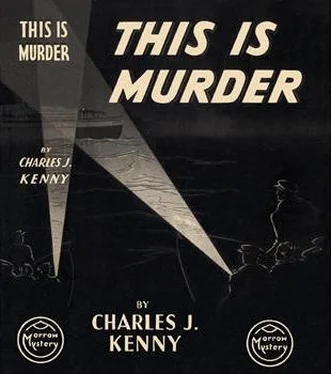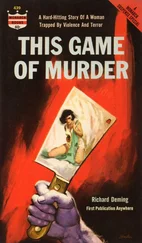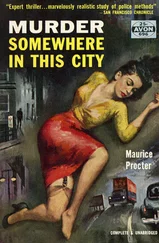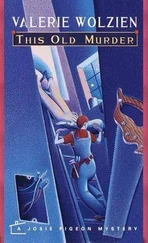Doris Bender grabbed for the gun. Moraine caught her ankle, jerked her feet from under her. She came to her knees with a jar. He jerked her foot again, and she went forward on her face. She twisted free and kicked at his face with her heels.
As Moraine dodged the kicking heels, Wickes made a supreme effort and threw him off. Moraine lit on hands and knees. Wickes lunged out in a tackle; Moraine avoided his arms. Doris Bender kicked at him, and Moraine crawled across the floor. Doris Bender screamed, “Look out, he’s after the gun!”
Wickes made another lunge and caught Moraine’s leg, but Moraine grabbed the gun, twisted around and clubbed Wickes on the head. Wickes loosened his hold; Moraine swung to a sitting position, held the gun on him and said, “Now, then, we’ll talk.”
“Don’t say a word,” Doris Binder half-screamed. “He’s dangerous as hell, Tom. He’ll trap you if you say a word.”
Moraine grinned at Wickes and said, “I saw that telegram Doris sent to you, so you can dispense with lying about what brought you here.”
Doris Bender started to cry.
“D-d-d-d-damn you,” she sobbed. “I knew you were going to be too f-f-f-f-fast for us.”
Wickes, with his left hand pressed to his head where Moraine hath struck him with the gun barrel, said, “Shut up, Dorry!”
Moraine kept the gun trained on Wickes.
“Where were you when Ann Hartwell was killed?” he asked.
“You can’t pin that on me,” Wickes said, gasping for breath. “I’ve got — a good alibi.”
“Where were you when Dixon was killed?”
“None of your damn business.”
Moraine said, almost dreamily, “A car ran along the boulevard and stopped within about a block of Dixon’s place. Ann Hartwell got out and walked toward Dixon’s house: Someone was driving that automobile. If you were the one who was driving the automobile, it would be a swell break for you to say so — if you could prove it.”
“Yeah,” Wickes said, breathing heavily, “put myself on a spot — last person to see her alive — all that sort of stuff...”
“Not at all,” Moraine replied cheerfully. “Witnesses heard the car stop and saw the girl get out of the car, and the car drive away. That would put you out of the picture as being the one who killed Ann, and if you drove away, they couldn’t pin Dixon’s killing on you.”
“They can’t — anyway.”
“Oh, you’d be surprised what they can do these days,” Moraine remarked cheerfully. “A clever politician who has a pull with the district attorney can accomplish a lot when it comes to pinning a murder on a man, particularly if the fellow’s guilty.”
“Go to hell!” Wickes said, almost sobbing.
“Now, then, let’s look at it the other way,” Moraine went on. “You, Doris and Ann had arranged to sell Thorne out to Dixon. Dixon was going before the Grand Jury. You knew that was going to be the blow-off, so you decided to scatter and keep under cover, where Thorne couldn’t find you. Doris was the first to go. Then you found out through me that Ann had been murdered. That put a terrific scare into you. You telephoned Doris.”
“That’s a lie!” Wickes yelled.
Moraine shook his head chidingly, and said, “Let’s get back to brass tacks. Before you skipped out, you learned that Dixon was dead. Then you wondered what had happened to the papers. You waited to find out. Thorne wouldn’t have connected you with the sell-out — not at first. He’d have figured on Ann and Doris. Then, when Doris figured that I was the one who had the papers, she thought it would be a cinch to grab them and keep Thorne from knowing he’d been sold out.”
“That’s a lie!” Doris said.
“Gosh, I wish you’d get a new line,” Moraine told her, “that one’s worn out. But let’s talk sense while we have the chance. If you’ll admit killing Dixon, Wickes, I think I can get you off with life. You see, I’m friendly with the district attorney. Of course, you would have to admit you were the one who drove that automobile, so that it would clear you on the murder of Ann Hartwell.”
Wickes glanced dubiously at Doris Bender.
“Don’t be a sap,” she said bitterly. “He’s trying to get you to...”
The door of the room burst open. Barney Morden and Carl Thorne barged into the room. Just behind them, came a powerful, broad-shouldered man who literally pushed the other two into the room and kicked the door shut.
“So!” Morden said, taking in the situation.
Moraine sighed, and said, “Barney, you certainly do get around. Why the hell don’t you stay in your own bailiwick?”
Thorne, moving forward, said, “We’ve got you now.”
“You haven’t got anyone,” Moraine said. “You haven’t any authority here. You touch me and I’ll...”
“Don’t be a damn fool, Sam,” Barney Morden said. “This here is George Stevens, the chief of police of this burg. We’ve got enough papers to cover the wall of the room, and we can get more. And you’re coming through.”
Doris Bender jumped to her feet, flung her arms around Carl Thorne.
“Carl!” she said. “Carl, protect me!”
He shook her off.
“You’re a two-timing little...”
“No, no!” she screamed. “You don’t understand! This man stole all of my papers.”
“What papers?” Thorne asked.
“All of Ann’s notebooks and all of the papers we had. He peddled them to Dixon and then he killed Dixon and took the papers. They’re in that suitcase.”
Thorne lunged toward the suitcase.
Moraine jumped for him.
“Don’t you dare,” he said, “to touch that suitcase without a search warrant. That suitcase is going to be surrendered to the proper authorities, and...”
Barney Morden, stepping forward, timed himself perfectly, and smashed his right fist full into Moraine’s face.
Moraine went over backwards, dropping the gun. Thorne, struggling with the suitcase, said, “It’s locked. How about getting some skeleton keys?”
“Cut it open,” Morden said.
“I’d rather pick the locks,” Thorne said. “We don’t know just what’s going to happen to this suitcase.”
“I’ll hold it in my office,” Stevens said.
Thorne gave a meaning glance to Barney Morden. Morden said hastily, “That’s right, we hadn’t better open it here. We’d better take it back to my office, because it’s evidence in a murder case. It hasn’t anything to do with this arrest, Stevens.”
Moraine ran a handkerchief over his cut lip and said, “Damn you, Barney! I’m going to get you for that.”
Morden paid no attention to him.
Wickes struggled to his feet and said, “Sock him one for me.”
Morden ignored Wickes, turned to Thorne.
“You might explain to Stevens, Thorne, that we’ll want to hold the prisoners here temporarily, but the evidence will go with us.”
“I’m not so sure,” Stevens said.
Thorne took a wallet from his pocket, held it in his left hand significantly for a moment, then put it back in his inside pocket.
“Let’s not discuss matters here,” he said. “We can do better if we talk privately.”
Stevens frowned thoughtfully, then slowly nodded his head.
Moraine, holding his handkerchief to his cut lip, said, “You birds don’t need to think you can bury me here. By God, I’ll bust this town wide open. You can’t pull your high-handed stuff here. I’m in a hotel and not in jail, and before you get me to jail the whole damn town will know that I want a lawyer.”
“Shut up,” Morden said impersonally, “before I paste you again, Sam. You’re elected.”
“Elected for what?” Moraine asked.
“Elected as the murderer of Pete Dixon,” Morden told him. “You were a damn fool. You took a lot of chances and you lost out. That suitcase full of papers pins the crime on you.”
Читать дальше








